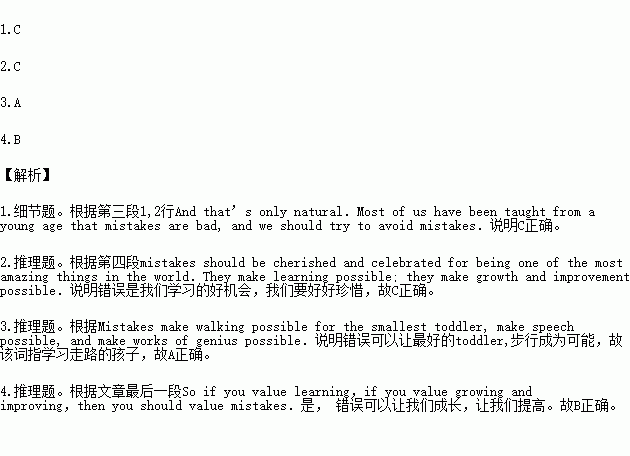题目内容
When you make a mistake, big or small, cherish it like it’s the most precious thing in the world.Because in some ways, it is.
Most of us feel bad when we make mistakes, beat ourselves up about it, feel like failures, get mad at ourselves.
And that’s only natural: most of us have been taught from a young age that mistakes are bad, that we should try to avoid mistakes.We’ve been scolded when we make mistakes—at home, school and work.Maybe not always, but probably enough times to make feeling bad about mistakes an unconscious reaction.
Yet without mistakes, we could not learn or grow.If you think about it that way, mistakes should be cherished and celebrated for being one of the most amazing things in the world: they make learning possible; they make growth and improvement possible.
By trial and error—trying things, making mistakes, and learning from those mistakes—we have figured out how to make electric light, to paint the ceiling of the Sistine Chapel, to fly.
Mistakes make walking possible for the smallest toddler, make speech possible, make works of genius possible.
Think about how we learn: we don’t just consume information about something and instantly know it or know how to do it.You don’t just read about painting, or writing, or computer programming, or baking, or playing the piano, and know how to do them right away.Instead, you get information about something, from reading or from another person or from observing, then you make mistakes and repeat, making mistakes, learning from those mistakes, until you’ve pretty much learned how to do something.That’s how we learn as babies and toddlers, and how we learn as adults.Mistakes are how we learn to do something new—because if you succeed at something, it’s probably something you already knew how to do.You haven’t really grown much from that success—at most it’s the last step on your journey, not the whole journey.Most of the journey was made up of mistakes, if it’s a good journey.
So if you value learning, if you value growing and improving, then you should value mistakes.They are amazing things that make a world of brilliance possible.
1.Why do most of us feel bad about making mistakes?
A.Because mistakes make us suffer a lot.
B.Because it’s a natural part in our life.
C.Because we’ve been taught so from a young age.
D.Because mistakes have ruined many people’s careers.
2.According to the passage, what is the right attitude to mistakes?
A.We should try to avoid making mistakes.
B.We should owe great inventions mainly to mistakes.
C.We should treat mistakes as good chances to learn.
D.We should make feeling bad about mistakes an unconscious reaction.
3.The underlined word “toddler” in Paragraph 6 probably means_________.
A.a small child learning to walk
B.a kindergarten child learning to draw
C.a primary pupil learning to read
D.a school teenager learning to write
4.We can learn from the passage that_________.
A.most of us can really grow from success
B.growing and improving are based on mistakes
C.we learn to make mistakes by trial and error
D.we read about something and know how to do it right away
 阅读快车系列答案
阅读快车系列答案
